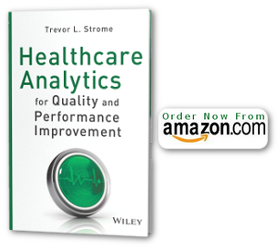[Editor’s Note: This guest post is written by Laura Madsen, Healthcare Practice Lead at Lancet Software, and founder of the Healthcare Business Intelligence Summit. We are happy to welcome Laura as a contributor!]
In August 2011, KLAS Research issued a report titled Business Intelligence: Making Cents of Performance. The report highlights something my colleagues and I predicted months ago; specifically, an increased need for business intelligence (BI) especially as the healthcare industry undergoes major shifts with regulation and reimbursement.
Authors state that “the ability to acquire fast and accurate business intelligence (BI) is becoming more essential for healthcare providers as they make critical decisions, such as whether to become an accountable-care organization and/or how best to meet the requirements of meaningful use on schedule.”
After working in healthcare BI for nearly 15 years, I can confidently say that BI is not new to healthcare. However, it has some level of “newness” among providers. Healthcare BI has been dominantly used in payer environments and has relied mostly on claims data for financial reporting. It’s often mirrored BI models in other industries.
Now, especially with the HI-TECH Act and Meaningful Use, we have the perfect storm for investment in healthcare data capture, storage and analytics. Today’s organizations must leverage a new and distinct approach to data, one configured specifically for an ever-changing landscape. Yet caution is necessary. Healthcare is a different “animal” than retail, manufacturing and finance. Healthcare data, especially clinical data, can be subjective. It is fragmented and often incomplete — making analysis and knowledge distillation an ongoing issue.
In comparing themselves to payers, many providers are realizing how far behind they are. Organizations must plan and implement BI with a focus on pragmatism and agility. ‘Enterprise BI’ is a solid, proven strategy, but mostly in other industries. Healthcare should be cautious and not consider enterprise BI as a “cure all.” Those who try to force enterprise BI as a quick fix, or view it as the be-all-and-end-all solution for MU or ACO initiatives may find themselves with a costly mess on their hands.
Rushing to BI is a mistake. Be wise. Listen to voices of reason. Taking time to be thorough and thoughtful does not necessarily translate into being slow. Organizations will have more opportunity to more effectively leverage data sooner if they start from a solid core basis, ensure fluidity as they evolve, and move slowly toward a more enterprise-type scenario.
I often share the story of a recent client engagement. A community hospital system struggled with cumbersome data structures. Each time a user requested a new report, the IT department created another view of the data. The hospital brought in consultants after its system had 2000 views. An incredible amount of replication and very few relationships existed. By applying basic data modeling and ETL (extract, transform, load), the organization quickly and cost-effectively streamlined its system — without sacrificing information or insights. This was the springboard to the organization’s entrée into BI, including the formulation of a BI team, the development of data governance policies, and progress with more comprehensive efforts to strategically plan for and leverage BI in their organization.
What’s the best way to move forward with BI? Years ago, I realized that educational offerings focused on healthcare BI were limited. That’s why I gathered with colleagues and developed the Healthcare Business Intelligence (BI) Summit. Being offered this year on Wednesday, October 12, 2011 from 7:30 am to 4:30 pm at the University of Minnesota’s McNamara Alumni Center, this event provides education and networking for busy executives seeking to improve their organizations’ ability to gather, store, process, analyze and distribute information. The summit will emphasize the importance of anticipating and managing increasing volumes of data from both existing and emerging technologies, and will explore ideas for cost-effective use of data to seize valuable information and actionable insights.
This year’s Healthcare BI Summit includes sessions from:
- Allana Cummings, Chief Information Officer, Northeast Georgia Health System, Inc.
- Marsha Zimmerman, Co-Project Manager for Meaningful Use,Hennepin County Medical Center
- Meghan Judd, EHR Project Manager,Hennepin County Medical Center
- Samuel VanNorman, MBA, CPHQ, Project Director/Innovator, Center for Healthcare Innovations, Hennepin County Medical Center
- Darren Taylor, Vice President, Enterprise Analytics and Data Management, Blue Cross and Blue Shield of Kansas City
- Skip Valusek, Director Clinical Analytics, HealthEast
- Jason McNamara and Nick Blake, Health Information Technology Coordinators, Centers of Medicare & Medicaid Services
- Trevor Strome, Informatics / Process Improvement Lead, Winnipeg Regional Health Authority, and Assistant Professor, Department of Emergency Medicine, Faculty of Medicine, University of Manitoba
This event is available at no cost to qualified executives in healthcare payer, provider, benefit administration, medical device and pharmaceutical/biotech companies. Registration at: www.healthcarebisummmit.com

{ 0 comments… add one now }